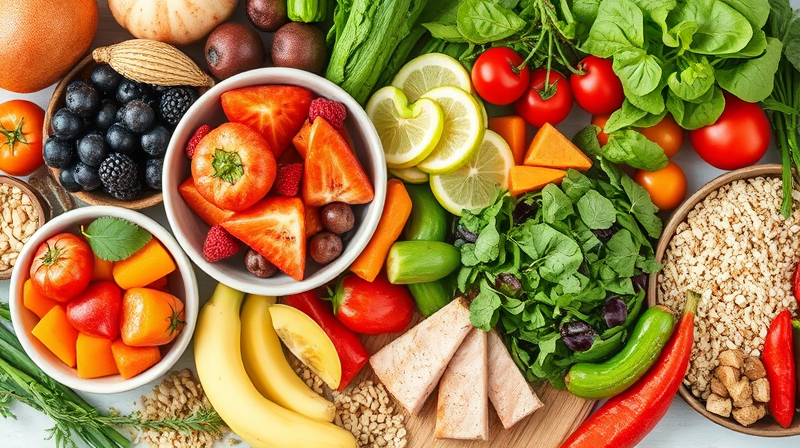Nutrient-dense foods are a cornerstone of a balanced diet, providing essential vitamins, minerals, and antioxidants that drive a healthy lifestyle. Embracing these foods not only boosts your overall well-being but also helps to reduce the risk of chronic diseases and improve energy levels. In this inspiring guide, we explore the benefits of nutrient-dense choices and offer simple yet effective strategies to integrate them into your daily meals.
Understanding the Power of Nutrient-Dense Foods
Nutrient-dense foods are those that pack a high concentration of beneficial elements such as vitamins, minerals, fiber, and healthy fats while being relatively low in calories. Unlike processed foods, which often contain empty calories, these options promote improved health and vitality.
When you focus on including whole fruits, vegetables, lean proteins, whole grains, and healthy fats in your diet, you provide your body with the essential tools to fight off disease, maintain proper bodily functions, and support overall energy levels.
Key Components of a Nutrient-Dense Diet
Integrating a variety of nutrient-dense foods ensures that your body receives a comprehensive range of essential nutrients. Below are detailed outlines of the components that make up a balanced and nourishing diet:
- Fruits and Vegetables: These are rich in antioxidants, fiber, and essential vitamins. Fruits such as berries, oranges, and bananas provide natural sweetness along with vitamin C and potassium, while leafy greens like spinach and kale deliver calcium, vitamin K, and folate. Cruciferous vegetables, including broccoli and Brussels sprouts, are known for their cancer-fighting properties.
- Lean Proteins: Foods like eggs, chicken, turkey, and fatty fish such as salmon cater to your body's need for amino acids and protein. Legumes, including lentils and chickpeas, are excellent alternatives that contribute to muscle building and repair with relatively low fat content.
- Whole Grains: Options like quinoa, brown rice, oats, and barley are abundant in fiber, B vitamins, magnesium, and selenium. They offer long-lasting energy and critical support to digestive health.
- Healthy Fats: Nuts, seeds, and avocados supply heart-healthy monounsaturated fats. Fatty fish and walnuts are additional great choices for omega-3 fatty acids, essential for brain function and cardiovascular health.
- Dairy and Alternatives: Low-fat dairy products like Greek yogurt, as well as fortified plant-based milk alternatives, provide protein, calcium, and probiotics that are crucial for bone health and digestion.
- Legumes and Beans: Including black beans or chickpeas in your meals provides a significant source of both protein and fiber while helping maintain stable blood sugar levels.
Practical Tips for Daily Nutrient Intake
Adopting a nutrient-dense diet doesn't require an abrupt overhaul of your eating habits. Instead, make small, manageable changes that add up over time. Below are several strategies to help you seamlessly incorporate nutrient-rich ingredients into your meals:
- Meal Planning: Organize your meals ahead of time so that each contains a blend of vegetables, lean proteins, whole grains, and healthy fats. For example, consider pairing oatmeal with fresh fruit and a handful of nuts for breakfast.
- Smart Substitutions: Replace refined foods with more nutritious alternatives. Swap white rice for quinoa or choose whole-grain bread over white bread. Replace sugary snacks with fruits, nuts, or a serving of Greek yogurt.
- Balanced Portions: Strive to fill half your plate with vegetables, one-quarter with whole grains, and one-quarter with lean proteins. This balanced approach ensures that you receive a variety of nutrients in every meal.
- Experiment with Cooking: Embrace new recipes that emphasize vegetables, grains, and lean proteins. Think roasted vegetable medleys, vibrant grain bowls, or refreshing berry smoothies that keep your taste buds happy while nourishing your body.
- Stay Hydrated: Opt for water as your primary beverage. Enhance your hydration with natural flavors like lemon or cucumber. Additionally, consider calcium-rich choices such as fortified almond milk as alternatives to sugary drinks.
Inspirational Health Benefits
Adopting a nutrient-dense diet brings a substantial number of health benefits:
- Weight Management: Foods high in nutrients but low in calories help control hunger, allowing you to maintain a healthy weight while still achieving your nutritional goals.
- Reduced Risk of Chronic Diseases: A diet abundant in fruits, vegetables, whole grains, and healthy fats contributes to the prevention of heart disease, diabetes, and certain types of cancer. The antioxidants and fiber found in these foods play a critical role in maintaining a healthy body.
- Enhanced Energy Levels: Complex carbohydrates found in whole grains and the balanced protein content in lean meats and legumes provide long-term energy, keeping you active and efficient throughout the day.
The small changes you make in your dietary habits can ignite a powerful transformation in your health. Committing to a nutrient-dense diet means you are prioritizing your long-term well-being, ensuring that every meal is a celebration of vitality and strength.
Embracing a Nourished Lifestyle
It is inspiring to realize that the path to better health is lined with simple choices. Each time you choose a nutrient-packed fruit or a bowl full of leafy greens, you are taking an important step towards a fortified life.
Remember: You don't need to make drastic changes overnight. Start by introducing one nutrient-rich item to your daily routine, and gradually expand your repertoire of healthy foods. Whether you are experimenting with new recipes or planning balanced meals, every effort contributes towards fostering a more energetic, vibrant, and resilient you.
By focusing on nutrient-dense meals, you not only enjoy the immediate benefits of improved energy and concentration but also lay down a solid foundation for enduring long-term health. With each mindful bite, you are fueling your body for success, empowering yourself with the nutrients it needs to perform at its best.
Embark on this journey with passion and purpose, and let your diet reflect the best version of yourself. Embrace the power of nutrition and unlock a healthier, happier future, one wholesome meal at a time!







